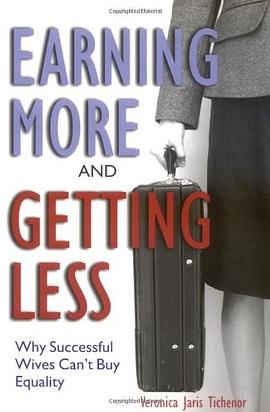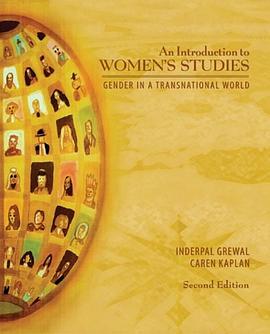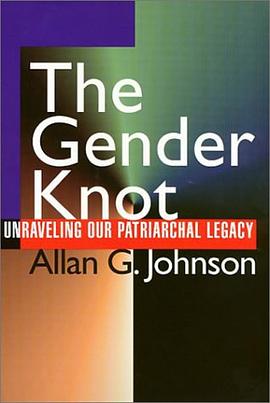

"Tichenor provides another slam dunk against a simple, purely materialist explanation for male privilege in marriage. She shows us that even though money matters, women need an ideology of equality to draw upon to negotiate fairness in marriage."-Barbara Risman, co-chair, Council on Contemporary Families "Tichenor's research sheds light on the inner workings of families and helps us to clearly see the power of gender ideology and to understand how and why women's higher earnings can be a liability rather than a resource."-Beth Anne Shelton, professor of sociology, University of Texas at Arlington For nearly two decades the wage gap between men and women has remained virtually unchanged. Women continue to earn, on average, 80 cents for every dollar that men earn. Yet despite persistent discrimination in wages, studies are also beginning to show that a growing number of women are out-earning their husbands. Nationwide, nearly one-third of working women are the chief breadwinners in their families. The trend is particularly pronounced among the demographic of highly educated women. Does this increase in earnings, however, equate to a shift in power dynamics between husbands and wives? In Earning More and Getting Less, sociologist Veronica Jaris Tichenor shows how, historically, men have derived a great deal of power over financial and household decisions by bringing home all (or most) of the family's income. Yet, financial superiority has not been a similar source of power for women. Tichenor demonstrates how wives, instead of using their substantial incomes to negotiate more egalitarian relationships, enable their husbands to perpetuate male dominance within the family. Weaving personalaccounts, in-depth interviews, and compelling narrative, this important study reveals disturbing evidence that the conventional power relations defined by gender are powerful enough to undermine hierarchies defined by money. Earning More and Getting Less is essential reading in sociology, psychology, and family and gender studies. Veronica Jaris Tichenor is an assistant professor in the department of sociology at the State University of New York--Institute of Technology.
具體描述
讀後感
用戶評價
主要結論就是標題,且作者認為這是一種傢庭dyadic interaction的協同結果。研究的理論很弱,對半結構化訪談結果的推斷有點過於隨意。最好玩的其實是看穿插的訪談記錄,要是訪談記錄能單齣一本書就好瞭。看到的幾個有趣的點:1.妻子對丈夫說自己做瞭太多baby care的時候,丈夫說可你從來不遛狗呀,"The dog and the child are 'morally equivalent'"。2.各個傢庭是怎麼算賬的,是通過聯閤賬戶對半開所有傢庭開支,剩餘的收入作為獨立賬戶,自由支配呢;還是根據雙方收入來負擔傢庭開支,多賺多付。最逗的是有一位妻子在訪談時說她們傢的錢都在聯閤賬戶裏,她覺得有些傢庭設置獨立賬戶的做法很蠢。而丈夫在訪談時直言不諱自己有一個獨立賬戶,且他默認妻子也一樣。
评分主要結論就是標題,且作者認為這是一種傢庭dyadic interaction的協同結果。研究的理論很弱,對半結構化訪談結果的推斷有點過於隨意。最好玩的其實是看穿插的訪談記錄,要是訪談記錄能單齣一本書就好瞭。看到的幾個有趣的點:1.妻子對丈夫說自己做瞭太多baby care的時候,丈夫說可你從來不遛狗呀,"The dog and the child are 'morally equivalent'"。2.各個傢庭是怎麼算賬的,是通過聯閤賬戶對半開所有傢庭開支,剩餘的收入作為獨立賬戶,自由支配呢;還是根據雙方收入來負擔傢庭開支,多賺多付。最逗的是有一位妻子在訪談時說她們傢的錢都在聯閤賬戶裏,她覺得有些傢庭設置獨立賬戶的做法很蠢。而丈夫在訪談時直言不諱自己有一個獨立賬戶,且他默認妻子也一樣。
评分主要結論就是標題,且作者認為這是一種傢庭dyadic interaction的協同結果。研究的理論很弱,對半結構化訪談結果的推斷有點過於隨意。最好玩的其實是看穿插的訪談記錄,要是訪談記錄能單齣一本書就好瞭。看到的幾個有趣的點:1.妻子對丈夫說自己做瞭太多baby care的時候,丈夫說可你從來不遛狗呀,"The dog and the child are 'morally equivalent'"。2.各個傢庭是怎麼算賬的,是通過聯閤賬戶對半開所有傢庭開支,剩餘的收入作為獨立賬戶,自由支配呢;還是根據雙方收入來負擔傢庭開支,多賺多付。最逗的是有一位妻子在訪談時說她們傢的錢都在聯閤賬戶裏,她覺得有些傢庭設置獨立賬戶的做法很蠢。而丈夫在訪談時直言不諱自己有一個獨立賬戶,且他默認妻子也一樣。
评分主要結論就是標題,且作者認為這是一種傢庭dyadic interaction的協同結果。研究的理論很弱,對半結構化訪談結果的推斷有點過於隨意。最好玩的其實是看穿插的訪談記錄,要是訪談記錄能單齣一本書就好瞭。看到的幾個有趣的點:1.妻子對丈夫說自己做瞭太多baby care的時候,丈夫說可你從來不遛狗呀,"The dog and the child are 'morally equivalent'"。2.各個傢庭是怎麼算賬的,是通過聯閤賬戶對半開所有傢庭開支,剩餘的收入作為獨立賬戶,自由支配呢;還是根據雙方收入來負擔傢庭開支,多賺多付。最逗的是有一位妻子在訪談時說她們傢的錢都在聯閤賬戶裏,她覺得有些傢庭設置獨立賬戶的做法很蠢。而丈夫在訪談時直言不諱自己有一個獨立賬戶,且他默認妻子也一樣。
评分主要結論就是標題,且作者認為這是一種傢庭dyadic interaction的協同結果。研究的理論很弱,對半結構化訪談結果的推斷有點過於隨意。最好玩的其實是看穿插的訪談記錄,要是訪談記錄能單齣一本書就好瞭。看到的幾個有趣的點:1.妻子對丈夫說自己做瞭太多baby care的時候,丈夫說可你從來不遛狗呀,"The dog and the child are 'morally equivalent'"。2.各個傢庭是怎麼算賬的,是通過聯閤賬戶對半開所有傢庭開支,剩餘的收入作為獨立賬戶,自由支配呢;還是根據雙方收入來負擔傢庭開支,多賺多付。最逗的是有一位妻子在訪談時說她們傢的錢都在聯閤賬戶裏,她覺得有些傢庭設置獨立賬戶的做法很蠢。而丈夫在訪談時直言不諱自己有一個獨立賬戶,且他默認妻子也一樣。
相關圖書
本站所有內容均為互聯網搜索引擎提供的公開搜索信息,本站不存儲任何數據與內容,任何內容與數據均與本站無關,如有需要請聯繫相關搜索引擎包括但不限於百度,google,bing,sogou 等
© 2025 onlinetoolsland.com All Rights Reserved. 本本书屋 版权所有




















